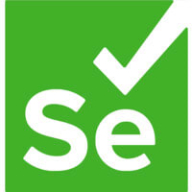

Selenium HQ and OpenText Functional Testing for Developers provide contrasting solutions in the test automation category. Selenium HQ stands out due to its zero-cost and versatility, making it popular among users. OpenText Functional Testing offers robust features ideal for large-scale environments, albeit at a higher cost.
Features: Selenium HQ supports multiple programming languages and browsers, making it flexible and adaptable. It boasts an open-source framework and a large community offering extensive support. OpenText Functional Testing provides comprehensive functional testing capabilities, integration with .NET frameworks, and a detailed toolset for developers seeking advanced testing features.
Room for Improvement: Selenium HQ users suggest improvements in cross-browser and mobile support, better handling dynamic content, and enhanced documentation. OpenText Functional Testing could improve with lower costs, increased stability, and more comprehensive technology support, with users requesting better concurrent testing and integration capabilities.
Ease of Deployment and Customer Service: Selenium HQ is widely deployed in various environments, supported by an active user community but lacks formal customer service. OpenText Functional Testing benefits from professional support services, providing direct assistance unlike Selenium’s community-driven problem-solving approach.
Pricing and ROI: Selenium HQ offers significant ROI as a cost-effective solution without licensing fees, suitable for businesses minimizing costs. OpenText Functional Testing incurs higher licensing expenses, justified by its premium features catering to complex needs in large enterprises, reflecting its investment in robust capabilities.
Initially, it was quite poor, but it seems they are making efforts to improve.
For technical support, I would give them an eight because whenever we have a concern, they immediately reach out to us.
The marketplace community and forums are what we browse and look after, and we have found solutions whenever we tried to find anything.
I have not had the need to escalate questions to Selenium HQ tech support recently, as open community support is widely available and has been sufficient for our needs.
We can execute thousands of test cases weekly, and our automation coverage using Selenium HQ is approximately eighty-five percent.
We regularly update the product, and overall, it is stable.
Selenium HQ is a scalable solution; it has been in production for the last two years, but I have been working on it for the last six years, so it is definitely scalable.
In some cases, object recognition is not 100%, and a customized solution is necessary.
An automatic update mechanism for Selenium HQ would be beneficial, eliminating the need for manual downloads and updates of browser drivers when new versions are released.
I don't know if we have that capability to provide different data sources such as SQL Server, CSV, or maybe some other databases, so that kind of capability would be great.
The price of OpenText UFT Developer is a bit higher than expected, but there are no better tools available for a valid comparison.
OpenText UFT Developer is user-friendly and integrates well with Visual Studio.
Selenium HQ supports multiple browsers via grid hosting and offers dynamic configuration setup for testing across Chrome, Edge, and Internet Explorer.
When we were doing these tests manually, it took several hours of effort, and those hours, when counted on the basis of person days, used to be maybe six or seven months of effort, which we can now do every day by running the pipeline.
| Product | Market Share (%) |
|---|---|
| Selenium HQ | 3.4% |
| OpenText Functional Testing for Developers | 3.0% |
| Other | 93.6% |


| Company Size | Count |
|---|---|
| Small Business | 2 |
| Midsize Enterprise | 12 |
| Large Enterprise | 29 |
| Company Size | Count |
|---|---|
| Small Business | 41 |
| Midsize Enterprise | 33 |
| Large Enterprise | 51 |
OpenText Functional Testing for Developers offers robust automation capabilities with support for complex algorithms, multi-platform testing, and developer-friendly integration using C# and Java, facilitating seamless testing transitions and efficient automation workflows.
This testing tool is highly valued for its integration with ALM and Jenkins, along with its developer-focused environment adaptable to Eclipse and Visual Studio. With AI-based object recognition, an object repository, and test framework integration, it bolsters DevOps practices while reducing IT workloads. Supporting UFT to LeanFT transition, it caters to SAP, Java, .NET environments, and more. Enhanced with stable automation, extensive protocol support, and both on-premises and cloud deployments, it targets performance, regression, and functional testing, while recording and screengrabs enhance automation capabilities. Future improvements could include expanded browser compatibility, enhanced JavaScript and mobile support, and better object recognition.
What are the key features of OpenText Functional Testing for Developers?Organizations implement OpenText Functional Testing for complex test automation on desktop, web, and banking applications, supporting performance, regression, and functionality testing across environments like SAP, Java, and .NET. UFT aids in GUI, infrastructure, and ERP application automation, with deployment options including on-premises and cloud implementations. Enhanced screengrabs and recording features aid in practical test case development, while addressing emerging technology needs is a focus.
Selenium HQ is an umbrella project that includes a number of tools and frameworks that allow for web browser automation. In particular, Selenium offers a framework for the W3C WebDriver specification, a platform- and language-neutral coding interface that works with all of the main web browsers.
Selenium is a toolset for automating web browsers that uses the best methods available to remotely control browser instances and simulate a user's interaction with the browser. It enables users to mimic typical end-user actions, such as typing text into forms, choosing options from drop-down menus, checking boxes, and clicking links in documents. Additionally, it offers a wide range of other controls, including mouse movement, arbitrary JavaScript execution, and much more.
Although Selenium HQ is generally used for front-end website testing, it is also a browser user agent library. The interfaces are universal in their use, which enables composition with other libraries to serve your purpose.
The source code for Selenium is accessible under the Apache 2.0 license. The project is made possible by volunteers who have kindly committed hundreds of hours to the development and maintenance of the code.
Selenium HQ Tools
These three main Selenium HQ tools have powerful capabilities:
Reviews from Real Users
Selenium HQ stands out among its competitors for a number of reasons. Two major ones are its driver interface and its speed. PeerSpot users take note of the advantages of these features in their reviews:
Avijit B., an automation tester at a tech services company, writes of the solution, “The driver interface is really useful. When we implement the Selenium driver interface, we can easily navigate through all of the pages and sections of an app, including performing things like clicking, putting through SendKeys, scrolling down, tagging, and all the other actions we need to test for in an application.”
Another PeerSpot reviewer, a software engineer at a financial services firm, notes, “Selenium is the fastest tool compared to other competitors. It can run on any language, like Java, Python, C++, and .NET. So we can test any application on Selenium, whether it's mobile or desktop."
We monitor all Functional Testing Tools reviews to prevent fraudulent reviews and keep review quality high. We do not post reviews by company employees or direct competitors. We validate each review for authenticity via cross-reference with LinkedIn, and personal follow-up with the reviewer when necessary.